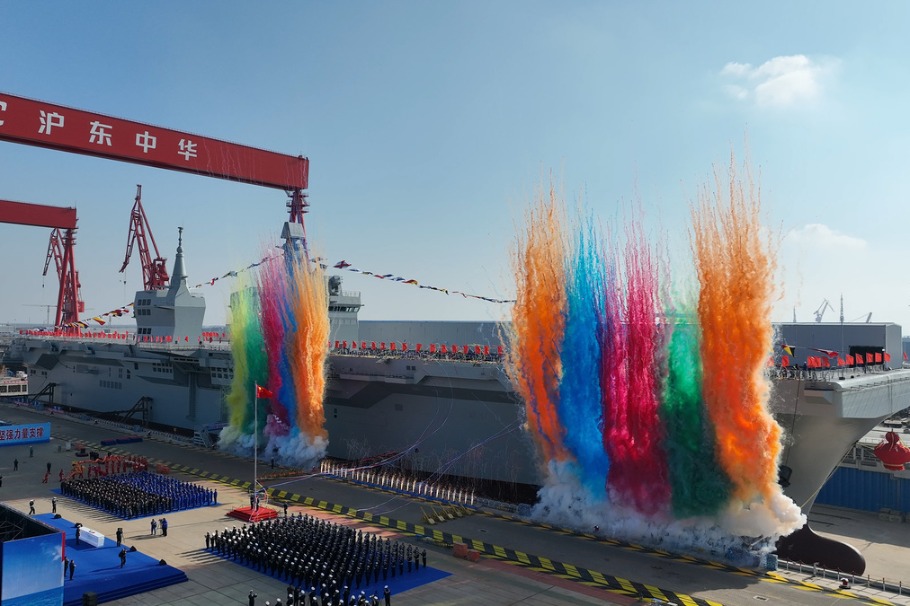No external disruptions please


China-Australia cooperation in the Asia-Pacific region should advance by responding to market needs rather than adapting to US interests
China and Australia are key economic and trade partners. According to the United Nations Commodity Trade Statistics Database (UN Comtrade), Australia imported goods worth $71.82 billion from China in 2023, which accounted for 24.9 percent of its total imports. This is 1 percentage point more than the combined imports from the United States, Japan and the Republic of Korea, which rank second, third and fourth among countries Australia imports from.
On the export side, Australia exported $120.22 billion worth of goods to China in 2023, which accounted for 32.6 percent of its total exports. This is 1.2 percentage points more than its combined exports to Japan, the ROK, India, the US, New Zealand, Vietnam, Indonesia and Singapore, which rank from second to ninth in Australia's export markets.
In its 2017 Foreign Policy White Paper, Australia first proposed the concept of "Indo-Pacific" partnerships to further bolster its role in global trade and strengthen economic and trade cooperation with economies in the "Indo-Pacific "region, aiming to place itself at the center of this region. However, the US adopted this concept and turned it into a tool to pressure China. The Joe Biden administration actively promoted the "Indo-Pacific Economic Framework for Prosperity" with four key pillars: trade (including digital trade), supply chains, clean energy (including infrastructure) and taxation (anti-corruption).
This framework seeks to establish a set of rules excluding China, one of the major regional economies.
Taking supply chains as an example, the agreement signed at the end of last year by 14 IPEF members, including Australia, came into effect on Feb 24, which established three bodies for supply chain coordination: the IPEF Supply Chain Council, the IPEF Supply Chain Crisis Response Network and the IPEF Labor Rights Advisory Board.
The agreement explicitly requires members to jointly monitor the supply chains of critical items, improve coordination and response during crises, enhance supply chain logistics, elevate workers' status, promote labor development and identify opportunities for technical assistance and capacity building. This essentially reflects the concerns of the US. In fact, the current instability of global supply chains is largely due to the US' proactive restrictions on international trade and unwarranted intervention in market activities. The US has not only transferred this anxiety to Australia, but also tried to institutionalize and perpetuate its influence through the IPEF.
Australia benefits from its rich resources and long-term economic growth driven by exports of natural resources. According to the World Bank, international trade accounted for 48.1 percent of Australia's GDP in 2023.Also, United Nations Conference on Trade and Development data show that Australia's most important export commodities are mineral fuels and ores, making up 35 percent and 28.1 percent of the export value, respectively, in 2023. On this note, its exports of these commodities to China were 5.9 percent and 76.6 percent. Developing and maintaining strong economic ties with China are vital for Australia. Excluding China's market is both unwise and impractical, whether in terms of trade networks or international investment links. It is even less advisable to directly adapt US interests into Australia's trade rules with China. Both China and Australia should uphold and adhere to the existing multilateral rules represented by the World Trade Organization, the bilateral economic and trade framework defined by the China-Australia FTA, and the regional rules of the Regional Comprehensive Economic Partnership. China and Australia are both members of the Asia-Pacific Economic Cooperation mechanism. A free and open Asia-Pacific means the development aspirations of all economies in the region should be fully respected. The Australian business community has high expectations for cooperation in the Asia-Pacific region, and hopes to continue expanding exports to China and the entry of Chinese new energy products (including electric vehicles) into the Australian market.
Chinese enterprises also have developed stably in Australia over the years. According to the Statistical Bulletin of China's Outward Foreign Direct Investment, by the end of 2022, Chinese enterprises' investment stock in Australia had reached $35.79 billion. Nearly 900 Chinese enterprises had set up locally, hiring more than 25,000 Australian employees. Among these, investments in the mining industry amounted to $16.15 billion, accounting for 45.1 percent of the total; investments in the leasing and business services industry totaled $7.04 billion, accounting for 19.7 percent.
With improved bilateral relations and reduced trade frictions, exports of Australia's iconic products, such as red wine, to China have accelerated, providing Chinese consumers with more quality options. China's vast market can create significant value for foreign goods and service providers with the willingness and capability to enter. For enterprises to have stable confidence in development and cooperation, not only commercial viability, but also long-term stability in the economic and trade cooperation environment are necessary.
China-Australia cooperation should advance in the Asia-Pacific region by responding to market needs, respecting market principles, and upholding the principle of openness and cooperation. By minimizing external disruptions and focusing on people-to-people exchange, the two countries can collaborate to enhance supply chain resilience, carry out institutionalized cooperation in areas such as climate change and foster a more accommodating and predictable business environment, providing reliable new business models and solutions to regional and global challenges.
The author is deputy director and research fellow at the Institute of American and Oceanian Study at the Chinese Academy of International Trade and Economic Cooperation, Ministry of Commerce. The author contributed this article to China Watch, a think tank powered by China Daily.
The views do not necessarily reflect those of China Daily.
Contact the editor at [email protected].


































